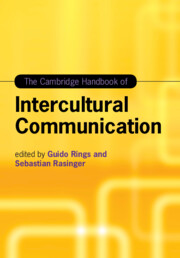Book contents
- The Cambridge Handbook of Intercultural Communication
- Cambridge Handbooks in Language and Linguistics
- The Cambridge Handbook of Intercultural Communication
- Copyright page
- Contents
- Figures
- Tables
- Contributors
- Acknowledgements
- Introduction
- Part I Introducing Intercultural Communication
- Part II Theoretical Approaches
- Part III Methods
- 12 Decolonizing Gender and Intercultural Communication in Transnational Contexts
- 13 Migration in the Digital Social Mediasphere
- 14 Linguistic Politeness
- 15 Contemporary Literature and Intercultural Understanding
- 16 Enhancing Intercultural Skills through Storytelling
- 17 Cinema as Intercultural Communication
- 18 Intercultural Memory and Violence in Jewish Literature
- 19 Intercultural Communication in Social Work Practice
- 20 Intercultural Education in Study Abroad Contexts
- 21 Intercultural Communication in the Courtroom
- Part IV Application
- Part V Assessment
- Index
- References
14 - Linguistic Politeness
from Part III - Methods
Published online by Cambridge University Press: 18 February 2020
- The Cambridge Handbook of Intercultural Communication
- Cambridge Handbooks in Language and Linguistics
- The Cambridge Handbook of Intercultural Communication
- Copyright page
- Contents
- Figures
- Tables
- Contributors
- Acknowledgements
- Introduction
- Part I Introducing Intercultural Communication
- Part II Theoretical Approaches
- Part III Methods
- 12 Decolonizing Gender and Intercultural Communication in Transnational Contexts
- 13 Migration in the Digital Social Mediasphere
- 14 Linguistic Politeness
- 15 Contemporary Literature and Intercultural Understanding
- 16 Enhancing Intercultural Skills through Storytelling
- 17 Cinema as Intercultural Communication
- 18 Intercultural Memory and Violence in Jewish Literature
- 19 Intercultural Communication in Social Work Practice
- 20 Intercultural Education in Study Abroad Contexts
- 21 Intercultural Communication in the Courtroom
- Part IV Application
- Part V Assessment
- Index
- References
Summary
Claus Ehrhardt proposes an approach that considers politeness as an integrative part to intercultural communication. Intercultural communication and politeness, Erhardt argues, are both theoretical models and social practices, with politeness forming one of the most prominent links between languages, cultures and communication, allowing for deeper understanding of intercultural communication. At the same time, he calls for more extensive empirical work to fully explore the dynamics of social relations in intercultural communication.
Keywords
- Type
- Chapter
- Information
- The Cambridge Handbook of Intercultural Communication , pp. 243 - 260Publisher: Cambridge University PressPrint publication year: 2020
References
- 1
- Cited by

